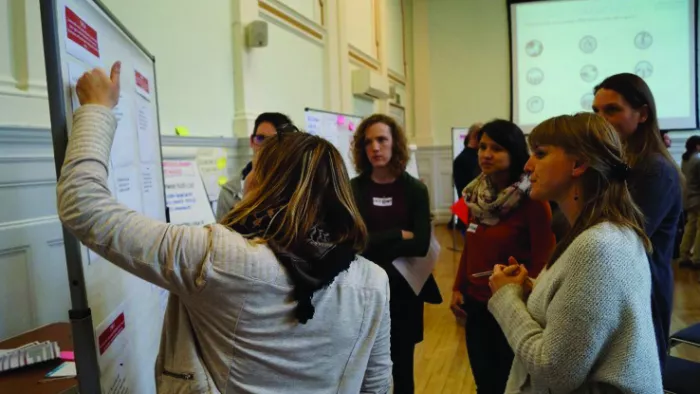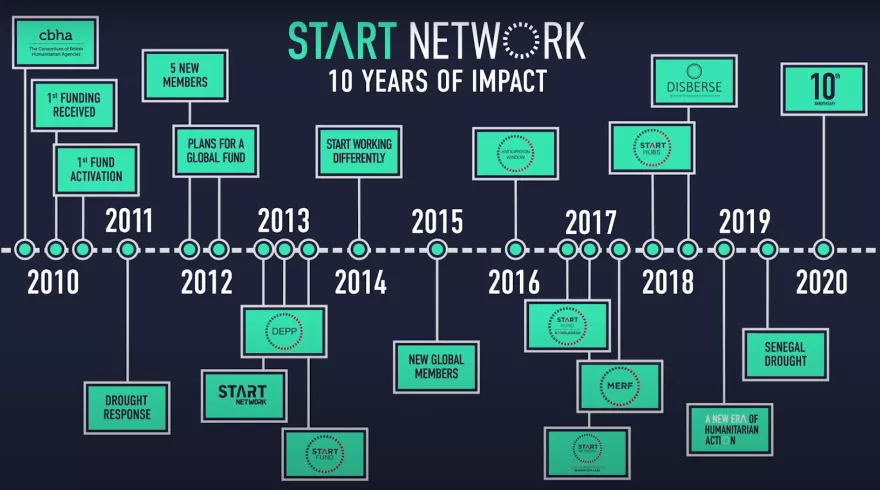Much of the current humanitarian system was shaped in the aftermath of the Second World War – at a time when problems seemed fewer and more soluble. There were high hopes for institutions like the United Nations, and a handful of recently formed international aid agencies were optimistic about the future.
In the seven decades since, humanitarian crises have come and gone with ever increasing frequency. Now there is widespread acknowledgement that, for many reasons, the system is no longer fit for the challenges of the 21st century. Ban Ki-moon, the United Nations' Secretary General, made this point at the first World Humanitarian Summit in May, 2016.
How Start Network began
Our network was born in 2010 from informal conversations between humanitarian leaders from aid agencies in and around London. They were frustrated by the challenges they faced. Governments were struggling to adapt quickly enough to tackle global problems such as climate change. Conflicts were becoming more frequent – and more violent – driving ever larger numbers of people to flee from one country to another.
Too much of humanitarian action seemed reactive, driven by politics or media attention and influenced by factors other than the needs of people directly affected by each crisis. If an event didn’t make newspaper headlines, there might be no response at all. When help did come it was often too late, or of the wrong kind.
The result was unnecessary human suffering, scarce resources used inefficiently, and crises that were allowed to escalate into disasters before anybody intervened.
2010: The Consortium of British Humanitarian Agencies
The humanitarians realised they had a common agenda. They were part of a system that was no longer delivering what was needed. They decided it was time to challenge and try to change the status quo.
Later in 2010, they brought together 15 agencies to form the Consortium of British Humanitarian Agencies (CBHA) hosted by Save the Children UK, with the goal of rethinking the humanitarian aid system – and of showing that by working together they could innovate, do things differently and deliver aid more effectively.
Together they won £8 million from the UK’s Department for International Development for an emergency response fund and an initial capacity-building project to help countries prepare for future disasters.
2012: launch of Start Network
In 2012 the CBHA became Start Network. The new name reflected:
- The increasingly international nature and global membership of the network.
- Its ambition to step in at the very beginning of each crisis.
- The determination of its members to launch pressing conversations about reinventing the humanitarian system.
Drawing on the shared knowledge and expertise of its members, the network has since embarked on a range of ground-breaking programmes.
2014: the Start Fund
The Start Fund, financed by the governments of Britain, Ireland and the Netherlands, was formally launched in April 2014. It was set up specifically to respond to the kind of small-scale crises that often pass unnoticed, but which affect millions of people each year. The fund filled a critical funding gap by providing a uniquely rapid response to these underfunded crises.
Another innovation is that it is the only such fund in the world to be managed entirely by its members.
By August 2016 the Start Fund had been activated on 76 occasions, and had reached 4.2 million people across 45 countries.
It was the first of many innovative new programmes for Start Network.
2015: Start Response and Start Labs
In 2015 Start Response began the first of three long-term projects that involved new levels of collaboration between members and partner agencies, tackling the Ebola emergency, displaced people in Cameroon and the European refugee crisis.
Start Labs was set up in parallel, to create a flow of new ideas and experiments for humanitarian action such as new financial and insurance mechanisms that could transform the entire aid system.
2020: our tenth anniversary
In 2020 we celebrated the changes our network had delivered over the past ten years: “a decade of positive disruption”. Because of the COVID-19 pandemic, we held our first virtual Assembly meeting alongside the anniversary celebrations. We also created the Start Fund COVID-19, enabling Start Network members to anticipate and respond to critical virus-related humanitarian needs in low-income countries.


